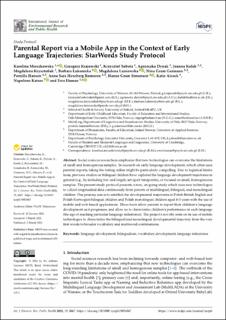Parental Report via a Mobile App in the Context of Early Language Trajectories: StarWords Study Protocol
Miezskowska, Karolina; Krajewski, Grzegorz; Sobota, Krzysztof; Dynak, Agnieszka; Kolak, Joanna; Krysztofiak, Magdalena; Lukomska, Barbara; Łuniewska, Magdalena; Garmann, Nina Gram; Hansen, Pernille; Romøren, Anna Sara Hexeberg; Simonsen, Hanne Gram; Alcock, Katie; Katsos, Napoleon; Haman, Ewa
Peer reviewed, Journal article
Published version
Permanent lenke
https://hdl.handle.net/11250/3013805Utgivelsesdato
2022-03-05Metadata
Vis full innførselSamlinger
Originalversjon
International Journal of Environmental Research and Public Health (IJERPH). 2022, 19 (5), 1-18. https://doi.org/10.3390/ijerph19053067Sammendrag
Social sciences researchers emphasize that new technologies can overcome the limitations of small and homogenous samples. In research on early language development, which often uses parental reports, taking the testing online might be particularly compelling. Due to logistical limitations, previous studies on bilingual children have explored the language development trajectories in general (e.g., by including few and largely set apart timepoints), or focused on small, homogeneous samples. The present study protocol presents a new, on-going study which uses new technologies to collect longitudinal data continuously from parents of multilingual, bilingual, and monolingual children. Our primary aim is to establish the developmental trajectories in Polish-British English and Polish-Norwegian bilingual children and Polish monolingual children aged 0–3 years with the use of mobile and web-based applications. These tools allow parents to report their children’s language development as it progresses, and allow us to characterize children’s performance in each language (the age of reaching particular language milestones). The project’s novelty rests on its use of mobile technologies to characterize the bilingual and monolingual developmental trajectory from the very first words to broader vocabulary and multiword combinations.

